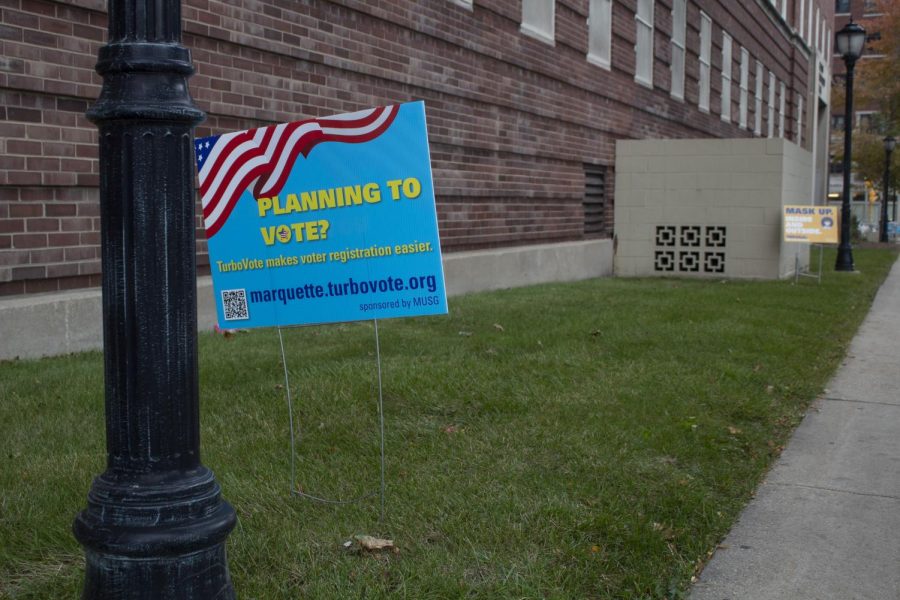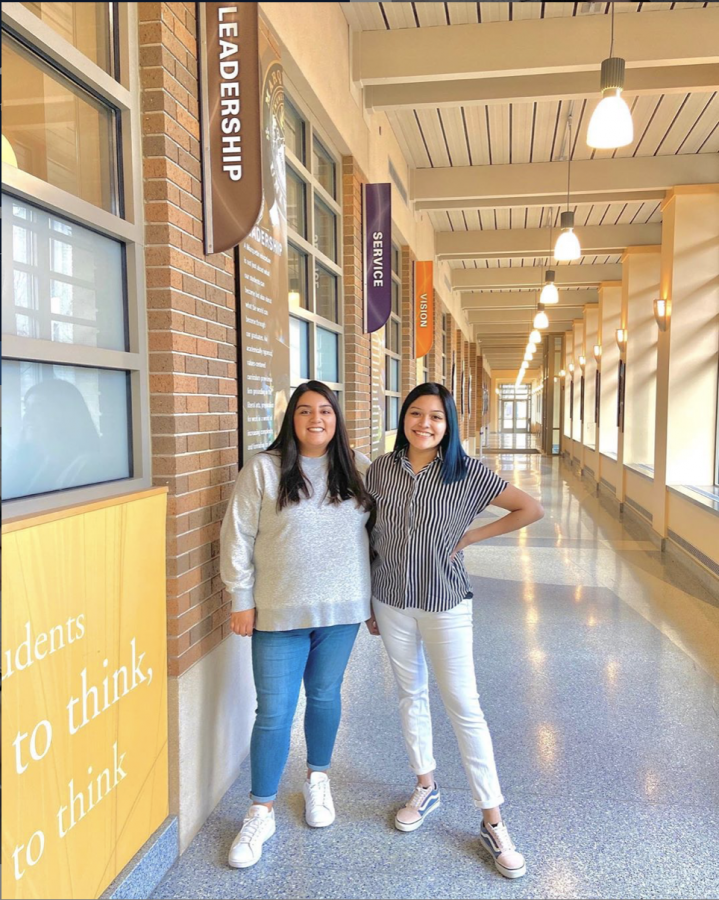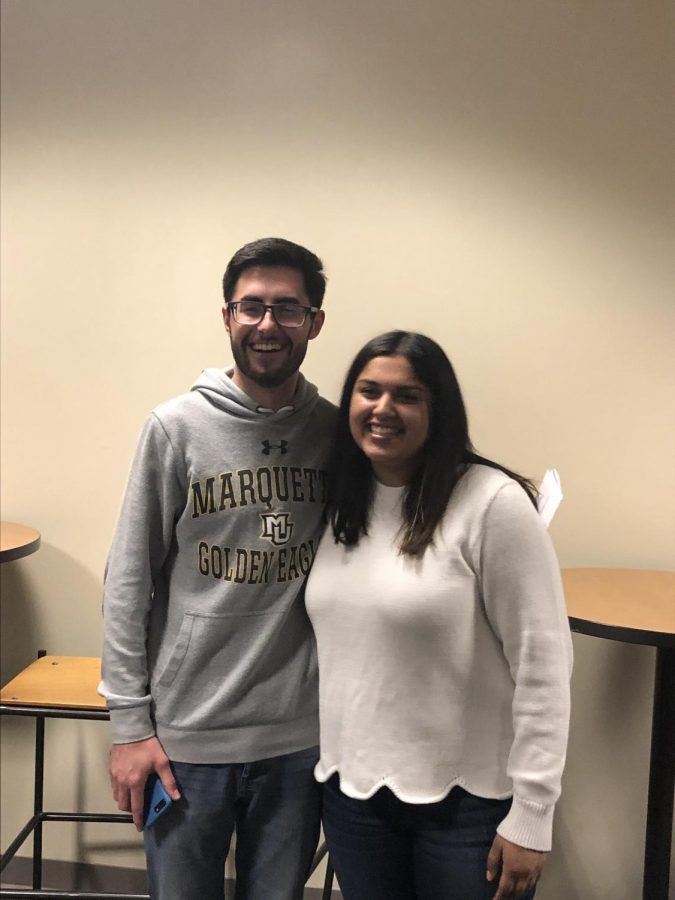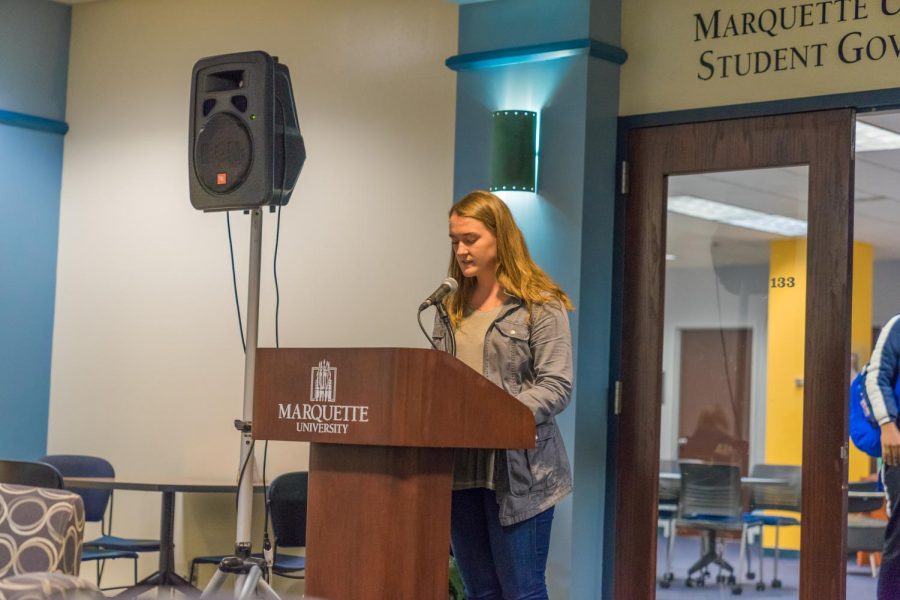
As students, there are many things we can’t control. Tuition, paper due dates and midterm exams can overshadow the fact that we chose to come here for a reason.
Yet one thing that is entirely within students’ power is selection of our representatives, the most recognizable office being that of Marquette Student Government president. But only 35 percent of the student body participated in the spring 2009 final election, according to MUSG documentation. With voter turnout so low, presidential hopefuls are encouraging students to make their voices heard and vote. This year’s decision could be the change that represents our wants and needs in more situations than we know.
Two running parties represent our decision this year: junior Meghan Ladwig and sophomore running mate Joseph Ciccone, both students in the College of Arts & Sciences, against Emil Ovbiagele and running mate Raviinder Gill, both sophomores in the College of Arts & Sciences.
Since only two pairs of candidates are running, there will be no primary election this year, but voters can submit write-in nominees on the ballot.
Students can vote in the final election online at http://musg.mu.edu/vote from 12:01 a.m. to 10 p.m. on March 25.
Meghan Ladwig and Joey Ciccone
Campaign Slogan: “Solving OUR issues.”
Why do you want to be MUSG president? What do you have to offer MUSG?
Ladwig: “I genuinely love Marquette University and believe that I have the leadership skills and experience necessary to be a leader of the student body, initiating improvements that will only make this university better for current and future students. I have been an active member of the MUSG Senate for five semesters, taking one semester away from Marquette to intern in Washington, D.C. I returned to Marquette with a drive to come back to the Senate and seek leadership of MUSG with the help of my friend and fellow senator, Joey Ciccone.”
What is the main focus or emphasis of your platform?
L: “We’re trying to cut (transition time) down to be as quickly moving as we can in getting things done. (We have) short term and long term plans for each (MUSG) committee, focusing on academics, student life, business and administration and student organizations.”
PLATFORM GOALS
Academics
- Posting of syllabi, major and minor requirements and class evaluations on department Web sites.
- Evaluation of the current advising practices within each college to target failures that have led to confusion in graduation requirements and study abroad opportunities, generating an overall feeling of distrust in the adviser-student relationship for many students on campus.
Transparency
- Creation of MUSG-SPAN in a collaborative effort with MUTV to display Senate meetings.
- Work with MUTV to put a podcast on the MUSG Web site.
- Poll students about issues through the MUSG Web site.
- Put the MUSG weekly agenda in the The Marquette Tribune.
- Post senators’ voting records on the MUSG Web site.
Student life
- Adoption of an alcohol amnesty policy that would allow students to seek help for an inebriated student without being punished for drinking.
- Creation of a student task force to work with administration on residence hall improvements, focused on a student wish list of functionality, sustainability and aesthetic improvements.
- Continuing current executive-board efforts to improve student wellness through renovation of the Rec Center.
Student organizations
- Creation of a diversity coalition that includes leadership of all organizations committed to specific issues of diversity to regularly discuss common ideas of tolerance and celebration.
- Continued support of student organizations through improvement of awareness of the Student Organizations Allocations process.
Business and administration
- Increase awareness and improvement of the commitment to the environmental sustainability of Marquette.
What makes your platform different from that of your opponent?
L: “I think that we really have a well-researched and planned out platform. We’ve talked to administrators about these issues for a few years now and really know the foundations and the basics and the facts about everything that we’re going with. We really just want to continue taking initiative now to hit those bigger issues in a leadership role.
“Short-term academic plans involving improvements to the department Web sites have all been discussed with the provost, vice provost, the Committee on Teaching and University Academic Senate, as well as numerous professors within each college. The development of a diversity coalition has been discussed in length with a diversity commissioner of MUSG as well as representation of many social awareness groups on campus.
“(I have) served on the (SOA) committee for two semesters.
“When discussing health and wellness here on campus, Joey made sure the MUSG recommendation called for a new Recreational Center here on campus. Furthermore, Joey sits on the Budget Committee, which brought to the Senate floor the $42,500 proposal to enact a sustainability survey which would look at how the university can make this idea come to fruition.”
How does your platform address the Sodexo and dining services issue?
Ciccone: “We don’t want to rush into anything. We want to make sure we keep this communication line strong and make sure that in the future, students will have somewhere where they can actually go to enjoy and eat.”
How do you plan to get students involved in the election/get them excited about your plans?
L: “So much time and effort has been put into this campaign during the past year that Joey and I are excited to finally be able to spend this month talking about our platform and leadership styles with students. Our excitement is reflected in all those that have committed to helping us get elected and in the student body that will vote on March 25. We are keeping our campaign lively with spontaneous ideas such as having the ‘Jump Around Guy’s’ wife wear our T-shirt at the (Notre Dame) basketball game (last) weekend, and we promise more surprises in the weeks to come.”
What do you want voters to remember most about your campaign?
L: “This has been a campaign that we’ve been planning for a long time. We’ve thought about (students) the entire process through. Nothing on our platform is going to serve as a launching pad to get us in a position to be president and vice president just for our own sake.”
C: “We want this to be the cleanest campaign possible. … We’re not going to do anything dirty. And even if we are elected, we’re not going to go into hiding.”
Emil Ovbiagele and Ravi Gill
Campaign slogan: “Transformation in the right direction.”
Why do you want to be MUSG president? What do you have to offer MUSG?
Ovbiagele: “It’s a need and an urge to transform MUSG into a more effective organization and an urge to want to take MUSG where it’s at right now to where it’s supposed to be. … It is mind-boggling that we still have people asking questions like, ‘What is MUSG? What does MUSG do?’ … If students still don’t know what their leadership body does, that should be a sign that the organization is not doing as much as it is supposed to be.”
What is the main focus or emphasis of your platform?
O: “It’s changing the current structure of MUSG from the legislative body to the executive body. I can tell you that the internal bureaucracies and small politics are the main reasons why MUSG does not function as it ought to function. And so, we would encourage an environment where independent and rational thought would rule over conformity, small politics, and bickering. … Secondly, we want to be the bold voice of the students. … We want to be advocates for students because our major priority is on the interest of students and not on the interest of the administration.”
PLATFORM GOALS
Academics
- Encourage midterm evaluations so professors can receive feedback from students and implement changes before the end of the semester.
- Work with administrators to create an anonymous Web site where students could enter concerns to their professors at any point in the semester.
Transparency
- Enforce an open-door policy where anyone is welcome to come speak with the president or vice president, anytime the officials are in the office.
- Assign a representative member of MUSG to attend at least two meetings for every student organization.
- Create an interactive Web site where every piece of legislation and idea can be tracked from the moment it’s presented by a senator to the time of completion.
- Emphasize welcoming students to Senate meetings to raise awareness of MUSG.
- Publicize student organization allocations in terms of how much was requested and how much was given for each organization via the Web site.
- Enforce the out-of-office hours every member of MUSG is required to hold elsewhere on campus, but not all do.
Student life
- Expand access to sexually transmitted disease testing and STD awareness on campus eliminating the “passivity” of the university on issues of sex.
- Adopt an alcohol amnesty policy.
- Collaborate with the Department of Public Safety in an effort to extend LIMO routes to Valley Fields.
- Develop the off-campus housing Web site to include a rating system so students could rate houses and buildings on campus, encouraging landlords to make their buildings safer.
- Work with DPS to install more cameras and blue light phones on campus.
Diversity
- Work with the Office of International Education to sponsor events that promote culture/diversity on campus and promote respectful dialogue on issues of race and the LBGTQ community.
- Create a policy whereby MUSG would support all diversity initiatives in terms of funds, support and publicity.
Green Initiatives
- Advocate greater use of the D2L Web site, the promotion of trayless dining and the encouragement of extensive education for dormitory residents on recycling.
- Encourage more recycling bins on campus.
- Work with professors to expand online submission of papers.
What makes your platform different from that of your opponent?
O: “It’s the fact that we’re ready to tackle the hard issues — the very hard ones. Expanding STD access and testing and fathering alcohol amnesty are not easy issues at a Catholic university. Currently, if you live in the dorms and your roommate is in need of medical assistance due to excessive drinking and you call DPS, after your roommate recuperates, you both get written up. This … has led to students not calling in such situations. That is very dangerous, and my fear is that Marquette might not actually realize the implications of such policies until someone loses their life.”
How does your platform address the Sodexo and dining services issue?
O: “I’m on the Student Life committee as a senator, and we’ve been working a lot with Sodexo. … We’re back to the negotiation table again. The way the current administration has left it, it would be a little too radical to upturn the whole process and come up with fresh ideas. … By the middle of fall semester, if there aren’t any changes to the current situation, we would move for more drastic measures.”
How do you plan to get students involved in the election/ get them excited about your plans?
O: “We have utilized the social networking Web sites. We’ve gone out on the streets with our cameras, asking students what they want. We’ve been going to different organizations trying to get them to vote. Everybody I meet, I tell them ‘Vote,’ because we believe nothing moves people more than the traditional way of word of mouth.”
Gill: “What we can ask of students is to have their voice heard, to vote on March 25 and be a part of this election so they can hold us accountable for what gets done this year.”
What do you want voters to remember most about your campaign?
O: “We want voters to remember that we’re a ticket that’s not scared of tackling the hard issues. … We’re candidates that will not marginalize their voices. We’re candidates that wouldn’t settle for anything less than the best for them.”
Audio: Clip of Jeff Engel’s interview with Meghan Ladwig and Joey Ciccone
Audio: Clip of Jennie Jorgensen’s interview with Emil Ovbiagele and Ravi Gill





